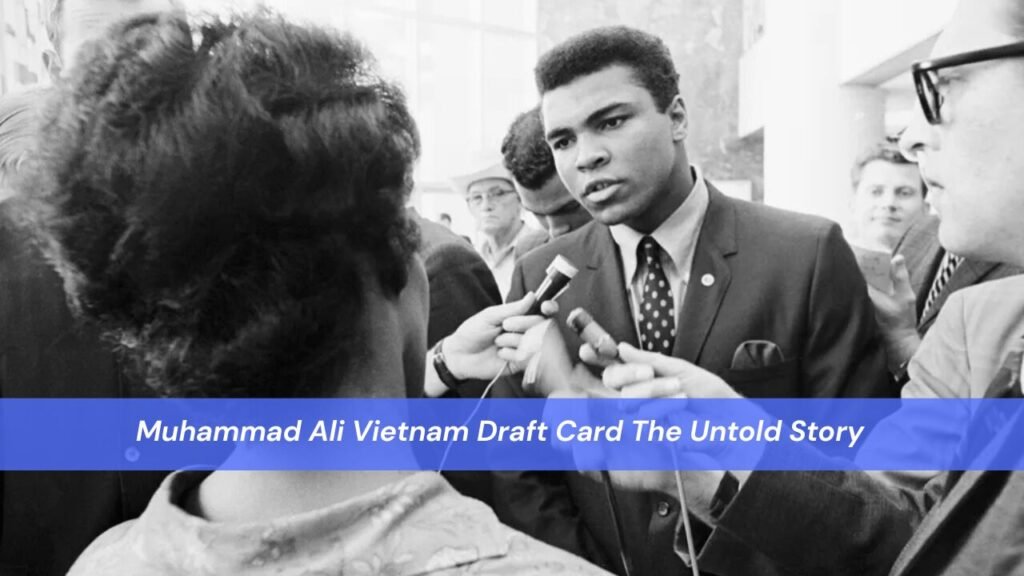The Muhammad Ali Vietnam draft card has reemerged as one of the most talked-about historical documents of 2025. When Christie’s announced that the unsigned draft card would go up for auction, historians, collectors, and civil rights advocates immediately recognized its profound importance. This simple government form, issued during one of America’s most divisive eras, symbolizes one man’s moral conviction against war and injustice, a decision that reshaped not only his boxing career but also his legacy as a global icon of conscience.
Today, the artifact represents more than a collectible. It encapsulates a transformative moment in U.S. history when a world heavyweight champion stood firm in his beliefs, even as the full weight of the government and public opinion turned against him.
Key Takeaways
Muhammad Ali’s unsigned Vietnam draft card symbolizes his historic refusal of the U.S. military draft and his stand for moral, religious, and civil rights convictions.
The artifact represents a defining moment in American history, highlighting Ali’s sacrifice of his boxing career for principles that reshaped his global legacy.
Christie’s 2025 auction places the draft card in the global spotlight, with an estimated value of $3–5 million due to its rarity, provenance, and cultural impact.
Beyond monetary worth, the draft card serves as a powerful reminder of conscience, resistance, and the lasting influence of individual courage during times of conflict.
A Defining Moment in American History
To understand the gravity of the Muhammad Ali Vietnam draft card, one must return to the turbulent landscape of the 1960s. The United States was embroiled in the Vietnam War, and the draft forced millions of young men into military service. For many, refusing induction meant imprisonment or exile. For Muhammad Ali, born Cassius Marcellus Clay Jr., refusal meant the loss of everything he had built in the boxing world.
In 1967, Ali received his draft notice. By this time, he had embraced Islam, changed his name, and declared allegiance to the Nation of Islam. Guided by his religious convictions and moral stance, he refused to be inducted into the U.S. Army, famously stating, “I ain’t got no quarrel with them Viet Cong.” This decision led to immediate repercussions: the stripping of his heavyweight title, a five-year prison sentence (later overturned), and a nationwide ban from boxing during the prime of his athletic career.
Ali’s defiance transformed him from a sports celebrity into a symbol of resistance. His case Clay v. United States (1971) eventually reached the U.S. Supreme Court, which unanimously overturned his conviction. The unsigned draft card that now surfaces at Christie’s is a tangible reminder of that extraordinary struggle, a document that stands at the crossroads of law, religion, race, and civil rights.
The Artifact What Makes the Muhammad Ali Vietnam Draft Card Unique
The draft card at the center of this auction is not just any bureaucratic form; it is the physical embodiment of one of the most courageous acts of defiance in modern sports history. Issued by the Selective Service System in early 1967, the card was properly filled out by officials but remained unsigned by Ali. That absence of a signature is what gives the document its powerful symbolism: a silent, written protest against a war he refused to support.
The card, which shows typical aging from its decades of existence, bears official government stamps and identification details authenticating its issuance. It was preserved by Ali’s descendants, who recently made the decision to place it on public auction. According to Christie’s, this provenance adds immense historical and monetary value, as items with direct lineage to the Ali family rarely reach the open market.
The condition of the draft card is considered excellent for its age, displaying the subtle wear expected of a document once carried by an individual during the 1960s. Experts note that its authenticity and unbroken chain of custody directly from Ali’s family to Christie’s elevate its collectible worth to the multi-million-dollar range. More importantly, the unsigned nature of the document transforms it from a simple military record into a bold statement of moral resistance.
The Auction Christie’s and the Global Spotlight
Christie’s has titled the sale “His Greatest Fight: Muhammad Ali’s Draft Card,” a fitting reference to Ali’s battle outside the ring that defined his legacy as much as any of his championship bouts. The auction runs online from October 10 through October 28, 2025, with a public preview at Rockefeller Center in New York. This exhibition allows collectors, historians, and fans to see the draft card in person before it changes hands, potentially forever.
The auction house estimates the piece will sell between $3 million and $5 million, a figure reflecting both its rarity and the immense cultural significance attached to it. Such valuations are not uncommon for artifacts tied to world-changing figures, but what makes this sale exceptional is its layered meaning: it’s not merely about celebrity memorabilia, but a record of personal courage during a national crisis.
Christie’s specialists have emphasized the card’s provenance and the historical context that surrounds it. The item’s placement in an online-only sale ensures global participation, drawing interest from collectors in North America, Europe, and the Middle East. For many bidders, owning this document is equivalent to possessing a fragment of living history, a small piece of paper that helped shift the conversation about race, religion, and personal freedom in America.
From the Ring to the Courtroom The Broader Legacy
Ali’s decision to refuse induction was met with outrage in 1967. Critics called him unpatriotic; sports writers labeled him a coward. Yet, as the war dragged on and public sentiment turned against it, many began to see Ali’s choice as a form of moral leadership. He sacrificed three prime years of his career when he could have earned millions to stand by his beliefs.
The Muhammad Ali Vietnam draft card serves as a physical timeline marker of that sacrifice. It represents the day Ali put principle before fame, conviction before comfort. His case drew support from civil rights leaders like Martin Luther King Jr., who described Ali’s stance as “a shining example of courage and integrity.” By the time the Supreme Court reversed his conviction in 1971, Ali had already won the fight for public opinion, emerging not only as “The Greatest” in the ring but also as a global voice for justice.
In the decades since, Ali’s refusal to sign the draft card has been analyzed in classrooms, documentaries, and museums as one of the most significant acts of conscientious objection in American history. It remains a teaching tool for discussions about moral autonomy, religious freedom, and the limits of state power.
Cultural and Market Significance of the Auction
For collectors, the appeal of this auction is multifaceted. It represents an intersection of sports history, civil rights heritage, and cultural memory. Unlike a championship belt or autographed glove, the draft card carries moral gravity it tells a story of conviction rather than competition. This moral narrative amplifies its value among serious collectors, institutions, and museums.
Institutions such as the Muhammad Ali Center in Louisville, Kentucky, have long been interested in artifacts that speak to Ali’s broader impact beyond boxing. Whether the card ends up in private hands or a public collection, its visibility at Christie’s underscores the ongoing dialogue about how we preserve and interpret moments of moral defiance.
Financially, experts believe the sale could set a new benchmark for political and civil rights memorabilia. As the market for historically charged documents expands, collectors are showing increasing interest in pieces tied to moral and cultural milestones rather than mere celebrity. The card’s dual significance as both a wartime document and an object of protest makes it nearly unparalleled in modern collecting history.
Lessons in Preservation and Authenticity
Owning or preserving a historical document like the Muhammad Ali Vietnam draft card requires expertise and care. Collectors are urged to verify provenance through detailed documentation and to obtain independent authentication when possible. Paper artifacts from the 1960s should be stored in acid-free materials, protected from light, and monitored for humidity to prevent deterioration.
Professional conservation can help maintain the integrity of such documents, ensuring they remain legible and stable for future generations. Christie’s provides condition reports for potential bidders, allowing them to understand the preservation state before purchase. Whether for a private collector or a public institution, stewardship of this item carries an ethical responsibility: to protect and share an artifact that represents not just one man’s journey, but a turning point in global civil rights history.
Broader Reflections The Value Beyond the Price Tag
While headlines often focus on the multimillion-dollar estimate, the deeper question is what this artifact tells us about courage and conviction. The Muhammad Ali Vietnam draft card is valuable not only because of its rarity but because it embodies the timeless struggle between conscience and conformity. Ali’s refusal to sign was not an act of defiance for its own sake; it was an assertion of personal integrity in the face of systemic pressure.
His choice resonates across generations, reminding people that moral conviction sometimes requires sacrifice. It’s why schools teach his story, museums preserve his image, and why, decades later, a small unsigned card can still move audiences to reflect on questions of duty, faith, and justice.
Frequently Asked Questions
What is being sold at Christie’s?
Christie’s is auctioning Muhammad Ali’s original Vietnam draft card, issued by the U.S. Selective Service in 1967.
Why didn’t Muhammad Ali sign the draft card?
Ali refused to sign the draft card as part of his conscientious objection to the war, grounded in his religious faith as a member of the Nation of Islam.
What is the estimated value of the draft card?
According to Christie’s, the Muhammad Ali Vietnam draft card is expected to sell for between $3 million and $5 million.
When and where is the auction?
The auction runs online from October 10 to October 28, 2025, with a public preview at Rockefeller Center in New York City.
Could the card end up in a museum?
Yes. While private collectors are likely to bid, public institutions such as the Muhammad Ali Center or the Smithsonian may also participate.
Conclusion
Muhammad Ali Vietnam draft card is far more than an artifact it is a statement of conscience immortalized in paper and ink. It tells the story of a man who refused to compromise his beliefs, even at the cost of his career and reputation. Through this card, we are reminded that true greatness transcends trophies and titles; it is defined by courage, conviction, and the willingness to stand alone for what is right.
As the world awaits the results of Christie’s auction, the card’s symbolic power continues to echo through time. Whether it finds a new home in a museum or a private collection, it remains an enduring testament to Muhammad Ali’s unwavering spirit a man who proved that sometimes, refusing to sign can be the most powerful signature of all.




